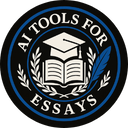Struggling to write a scientific paper? AI tools for scientific paper writing can make the process faster and easier. This guide will show you how these tools improve accuracy, save time, and boost your writing.
Keep reading to discover the best tools and tips!
Key Takeaways
- AI tools like ChatGPT and QuillBot help write faster, improve grammar, and fix errors. They reduce writing time by up to 50%.
- Scholarcy and Scite.ai summarize research papers and analyze citations. These save time while ensuring accuracy in academic work.
- Tools such as Paperpal automate citation formatting in over 10,000 styles. This prevents errors and maintains academic standards.
- Always review AI-generated content for accuracy to avoid “hallucinations.” Verify sources using trusted databases like peer-reviewed journals.
- Proper attribution of AI tools is essential for ethical writing. Follow institutional rules on using generative AI features in research.

Benefits of Using AI Tools for Scientific Paper Writing
AI tools make writing papers faster and easier. They help improve language, fix errors, and organize ideas smoothly.
Enhanced Efficiency and Speed
AI tools help write faster by automating many tasks. ChatGPT, for example, can generate drafts quickly. Researchers say this cuts writing time by up to 50%. Editing also becomes easier with built-in grammar checks and contextual suggestions in tools like QuillBot.
Repetitive processes like formatting or rewriting save hours. Automated features reduce manual effort in citation creation or research summarizing. Using Scholarcy or Scite.ai speeds up reading and analyzing papers, letting researchers focus more on their work.
Using AI saves both time and energy—allowing writers to concentrate on their ideas instead of tedious edits.
Improved Accuracy and Language Quality
Boosting speed isn’t enough for scientific writing; accuracy matters too. AI-powered tools like Writefull improve grammar, clarity, and readability. They offer real-time language suggestions to fix mistakes or awkward phrasing instantly.
QuillBot helps with paraphrasing while refining grammar in research papers. These tools ensure academic writing is precise and professional. This level of quality reduces errors and strengthens your argument’s impact.
Automated Citation and Referencing
AI tools can handle citations in over 10,000 styles. Tools like Paperpal ensure proper formatting for academic standards. They automatically generate accurate references, saving time and effort.
These tools prevent errors in citation placement or style selection. This improves the quality of academic writing. Features like automated citation management are vital for managing sources from PDFs and web searches effectively.
Addressing Writer’s Block
Writer’s block can slow down academic writing. Tools like ChatGPT help by brainstorming ideas and generating outlines. It quickly provides research keywords, narrowing topics effectively for focused writing.
Using AI like QuillBot improves sentence flow when stuck on phrasing. Scholarcy summarizes complex studies into simple points, sparking new ideas for your text. Move to tools best suited for drafting next!
Best AI Tools for Research and Writing
Discover powerful AI tools that can speed up your writing, fix grammar mistakes, and help with scientific research—read on to learn how they can transform your work!
ChatGPT for Idea Generation and Drafting
ChatGPT speeds up academic writing. It generates outlines or drafts within seconds. The free version offers basic help, while ChatGPT Plus provides advanced features for $20/month.
You can use it to brainstorm ideas, create structured content, and simplify complex topics.
Its generative AI features ensure clear and contextual writing suggestions. Write faster without worrying about grammar checks or language flow. Use it in Google Docs or Microsoft tools for seamless editing.
For researchers facing writer’s block, this tool acts as a constant guide to keep the process moving smoothly.
QuillBot for Paraphrasing and Grammar Improvement
QuillBot helps refine academic writing with ease. It offers a free tier for basic paraphrasing, perfect for straightforward edits. The Premium plan costs $4.17 per month (billed annually), giving users access to advanced features like grammar checks and improved sentence structure.
This tool improves language quality in scientific papers by offering contextual writing suggestions. Its AI enhances clarity while fixing errors efficiently. Students and researchers use QuillBot to avoid plagiarism by rephrasing text accurately and maintaining the original meaning of ideas.
Scholarcy for Summarizing Research Papers
Scholarcy simplifies academic research by breaking down papers into key points and summaries. It scans the document, extracts main ideas, and highlights important data. You can use its free plan to create up to three summaries daily.
Scholarcy Plus costs just $4.99 per month for unlimited access.
The tool saves time by automating summaries and helps avoid missing crucial details in complex texts. Its features include citation extraction and highlighting section-specific findings.
With Scholarcy, you gain fast insights into lengthy research papers without extra effort or confusion.
Next up: exploring “SciSpace for Research Navigation.
SciSpace for Research Navigation
SciSpace simplifies finding academic papers. The free tier offers basic search features, perfect for beginners. For advanced tools, its Premium Plan costs $12 per month if paid yearly.
Institutions can choose the Institution Plan at $8 per user monthly (also billed annually).
It supports researchers by providing accurate references and research navigation tools. SciSpace ensures privacy with strong cyber security measures, keeping your data safe while you explore the web for scientific resources like climate change studies or academic text improvement tasks.
Elicit for Scientific Question Answering
Elicit uses AI to sort and summarize scientific research. It finds answers by searching papers related to academic writing, science, or studies. This helps researchers save time while improving efficiency.
The tool identifies key studies and data fast. It also ensures accuracy in academic text by pulling reliable sources. With Elicit, users tackle writer’s block by accessing clear insights from trusted research findings.
Scite.ai for Citation Analysis
Scite.ai examines how citations are used in research papers. It provides insights into whether a citation supports, questions, or contrasts the cited work. This makes it easy to check credibility and understand the relevance of references.
The tool integrates with popular research databases for seamless use. Its features save time by analyzing multiple references at once. Move forward to explore key features needed in AI tools!
Key Features to Look for in AI Tools
Choose tools with strong features to boost your writing. Focus on those that ensure quality and protect your work.
Plagiarism Detection
Plagiarism detection tools ensure academic writing stays original and ethical. They check text against large databases to find copied content or repeated phrases. For example, Paperpal allows up to 7,000 words per month for a thorough review.
These features prevent academic misconduct by catching accidental duplication.
AI-driven plagiarism checkers like Paperpal help maintain content quality while focusing on originality. By scanning scientific papers and citations, these tools protect authors from unintentional errors or overlaps.
This ensures research meets strict ethical standards without extra effort.
Consistency Checks
Accurate grammar checks are essential, but consistency is key to polished academic writing. AI tools review documents for uniformity in language, style, and formatting. Tools like Scite.ai ensure cohesion by aligning terminology across sections.
They monitor repeated terms and provide smooth contextual writing suggestions.
Automated features identify mismatched styles or inconsistent citations. This helps maintain clarity and professionalism in your academic text. Consistency checks improve readability while minimizing human errors in scientific papers.
These measures result in structured content with fewer gaps or overlaps, improving quality.
Pre-submission Reviews
Pre-submission reviews catch mistakes before submission. They focus on grammar, language quality, and consistency checks. Tools like Writefull offer real-time feedback on style and clarity during this step.
These reviews improve the academic text by suggesting edits for better flow and structure.
Such tools also detect plagiarism or hallucinated content early. By refining your scientific paper at this stage, you ensure higher accuracy and polish. Learn about other features like privacy safeguards next!
Privacy and Data Security
AI tools often require users to create accounts. During the process, personal data might be collected and used for training AI systems. To protect privacy, avoid sharing sensitive details like unpublished academic text or confidential information.
Using a secure connection, such as a VPN, can add an extra layer of safety.
Paperpal is ISO/IEC 27001:2013 certified, ensuring high standards in data security. Always choose tools with strong encryption features and clear privacy policies. Prioritize options that align with ethical writing practices while safeguarding your work from misuse or leaks.
Tips for Effectively Using AI Tools in Academic Writing
Learn how to use AI tools wisely to boost your writing while keeping your work accurate and ethical—read more for simple, smart tips!
Combining Multiple Tools for Comprehensive Support
Use Blainy for writing drafts and ResearchRabbit for exploring topics. Pair Scite.ai to check citations with ChatGPT to draft academic text faster. These tools strengthen efficiency, accuracy, and depth in scientific paper writing.
Blainy simplifies grammar checks while QuillBot improves language quality by rephrasing sentences. Scholarcy summarizes papers, saving research time, while SciSpace helps find detailed studies.
Combining these enhances both workflow speed and content quality.
Reviewing AI-Generated Content for Accuracy
AI tools can sometimes create false or inaccurate information. These errors, called “hallucinations,” may harm the credibility of academic writing. Always check AI-generated content against reliable sources like peer-reviewed journals and verified databases.
Verifying facts ensures your paper stays accurate and professional. Perform grammar checks and consistency reviews to spot errors in academic text. Tools like Scite.ai help analyze citations for reliability, strengthening your work’s integrity.
This step protects both quality and ethics in scientific writing.
Ensuring Proper Attribution and Ethical Use
Always credit AI tools or software used in academic writing. Proper attribution avoids plagiarism and upholds transparency in research. For example, if ChatGPT helps draft an academic text, note its input clearly in acknowledgments or footnotes.
Ethical guidelines stress honesty about using generative AI features to assist with grammar checks or contextual writing suggestions.
Follow strict rules on ethical use of such tools. Never misuse them for tasks like fake analysis creation or claiming content as purely original when it is AI-generated. Many institutions now include policies on this topic, so always check their requirements first.
Next comes exploring AI Tools for Summarizing Scientific Papers…
AI Tools for Summarizing Scientific Papers
Perplexity AI and Scholarcy make summarizing academic text fast and easy. Scholarcy highlights key ideas, saving hours of reading long papers. Perplexity AI offers clear summaries and supports research questions directly in its interface.
ChatGPT-4o mini gives limited free use for summarizing tasks but works well for quick reviews. Gemini and Microsoft Copilot also help break down dense scientific content into shorter pieces.
These tools improve efficiency while keeping the language accurate and concise.
Conclusion
AI tools make writing scientific papers easier and faster. They help with grammar, citations, and even brainstorming ideas. Tools like ChatGPT, Scholarcy, and Paperpal offer great features to improve your work.
Always double-check AI results for accuracy to avoid errors. With the right tools and careful use, you can write better papers in less time!
For more detailed insights into the top AI tools for summarizing scientific papers, click here.


Leave a Reply